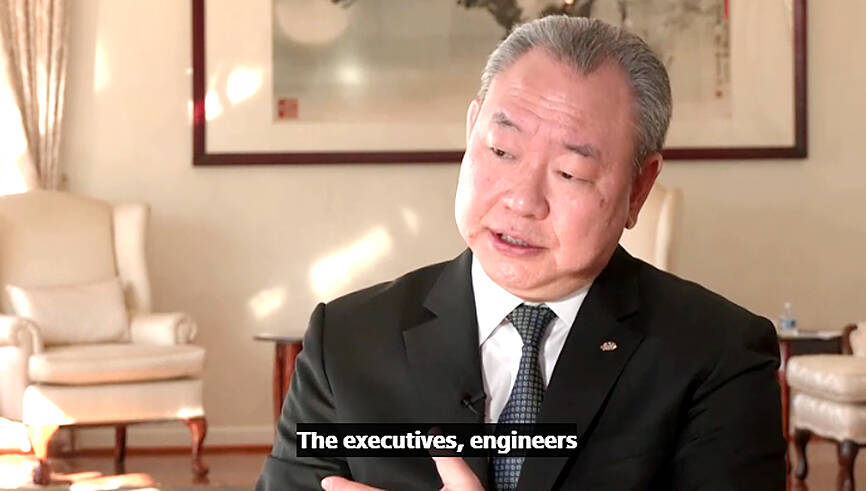China has sought to “cheat” and “steal” its way to matching Taiwan in chip technology, but has yet to succeed despite investing huge sums, Representative to the US Alexander Yui said on Wednesday, while holding out the prospect of more Taiwanese semiconductor investment in the US.
In an interview with Reuters, Yui, who arrived in Washington in December last year, cast doubt on reports that China’s chipmakers are on the cusp of making next-generation smartphone processors, and refuted charges by former US president Donald Trump, the leading Republican candidate for the US presidential election in November, that Taiwan was taking American semiconductor jobs.
“They don’t really follow the rules. They cheat and they copy, etc. They steal technology,” Yui said of China’s chipmakers, adding that he had doubts about whether they could make viable next-generation processors as early as this year amid US efforts to curb Beijing’s development of advanced technologies.

Representative to the US Alexander Yui speaks in a Reuters interview which was posted online yesterday.
Photo: Screen grab from Reuters’ Web site
A spokesperson for the Chinese embassy in the US said such a claim “has no common sense” and is ill-intentioned.
“China’s scientific and technological achievements are never made through ‘cheating’ and ‘stealing.’ Our development is always built on our own strength, and we are confident of continuing to strengthen China’s capability to seek self-reliance and technological innovation,” embassy spokesman Liu Pengyu (劉鵬宇) said.
Washington said China uses its huge market and control over supply chains to coerce countries to transfer strategic technology, and that its extensive cybertheft makes it the top threat to US technological competitiveness.
Taiwan’s spy catchers have investigated numerous Chinese companies suspected of illegally poaching semiconductor engineers and other tech talent.
US companies are restricted by Washington from providing technology without a special license to certain Chinese chipmakers, including Semiconductor Manufacturing International Corp (SMIC, 中芯), over their alleged work with China’s military.
“Those companies that they have spent billions of dollars on have basically floundered,” Yui said.
Trump last year told Fox News that Taiwan, which is the world’s leading producer of advanced chips, had taken away US business in the industry and should have faced US tariffs.
Some analysts have speculated that his comments reflected a desire to curtail US support for the nation should he be elected.
Trump’s administration nonetheless approved billions in defense sales to Taiwan.
“Actually we are partners... And it’s not the way Mr Trump has said,” Yui said. “Our companies are looking at new ways to strategically reposition themselves in different countries, and we were happy to see our companies are considering the United States, for example — TSMC [Taiwan Semiconductor Manufacturing Co, 台積電] in Arizona. And I think there will be more to come,” he said.
TSMC is the world’s largest contract chipmaker.
Yui declined to say whether Taiwan had sought to engage with the Trump campaign, but said the nation enjoyed the friendship and support of both Democrats and Republicans.
A sweeping international security assistance package that includes billions of dollars for Taiwan has been stalled in the US Congress by Republicans’ insistence that it also include an overhaul of US immigration and border security policy.
“We welcome any help that comes from the United States, from Congress and the administration, to beef up Taiwan’s defense capabilities,” Yui said.
The US military is looking to partners in the Pacific for secure locations to stockpile equipment and munitions in the event of any conflict with China.
While the US president is permitted under law to create a regional contingency stockpile of munitions and defense articles for Taiwan, Yui downplayed the possibility they would be placed on in the nation.
“The stockpiles won’t happen in Taiwan, I think,” he said.
Source: Taipei Times - 2024/02/09




















